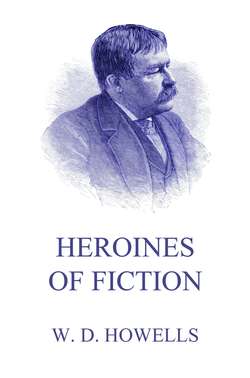Читать книгу Heroines Of Fiction - William Dean Howells - Страница 5
На сайте Литреса книга снята с продажи.
I
ОглавлениеThe best thing in the expression of any sort of modernity is a voluntary naturalness, an instructed simplicity; and there is no writer of the present moment, not Mr. Hardy, not Count Tolstoy himself, who is more modern than Defoe in these essentials, though Defoe wrote two hundred and fifty years ago. But we cannot go back to Defoe in this place any more than we could turn, say, to M. Zola. Defoe is distinctly of the nineteenth century in the voluntary naturalness and instructed simplicity of his art, but he is no more of the English nineteenth-century tradition, or principle or superstition, call it what you will, than M. Zola. He wrote the clearest, purest English, the most lifelike English; and his novels are of a self-evident and most convincing fidelity to life. But he was, frankly, of the day before we began to dwell in decencies, before women began to read novels so much that the novel had to change the subject, or so limit its discussion that it came to the same thing. Defoe was of a vastly nobler morality than Fielding, and his books are less corrupting; they are not corrupting at all, in fact; they are as well intentioned as Richardson's, which sometimes deal with experiences far from edifying in order to edify. He is a greater, a more modern artist than either of the others; but because of his matter, and not because of his manner or motive, his heroines must remain under lock and key, and cannot be so much as named in mixed companies. Defoe's novels cannot be freely read and criticized; only his immortal romance is open to all comers, of every age and sex, and it is a thousand pities that " Robinson Crusoe " has no heroine. We must not begin to study our heroines of nineteenth-century fiction with him, though, aesthetically and ethically, nineteenth-century fiction derives from him in some things that are best in it, especially in that voluntary naturalness and instructed simplicity which are the chiefest marks of modernity.
We cannot begin a hundred years later with the heroines of Samuel Richardson, though one of them at least is as freshly modern as any girl of yesterday or tomorrow. Clarissa Harlowe, in spite of her eighteenth-century costume and keeping, remains a masterpiece in the portraiture of that Ever-Womanly which is of all times and places. The form of the novel in which she appears, the epistolary novel, is of all forms the most averse to the apparent unconsciousness so fascinating in a heroine; yet the cunning of Richardson (it was in some things an unrivalled cunning) triumphs over the form and shows us Clarissa with no more of pose than she would confront herself with in the glass. It is in her own words that she gives herself to our knowledge, but we feel that she gives herself truly, and with only the mental reserves that a girl would actually use: there is always some final fact that a girl must withhold.
She gives not herself alone, but all her environment, vividly, credibly, convincingly, in the letters she writes. She persuades us that she lives and suffers; and though it is preposterous in the novelist to study her love-affair so minutely as he does, it is not preposterous but most simple and natural for her to dwell upon it in every detail. It is all the world, the center of the universe to her experience, and however the author permits her to tire the reader, she cannot be supposed to tire herself or tire her ardent friend and correspondent, Miss Anna Howe, in her unstinted outpourings. Indeed, when the reader has once put himself in sympathy with a heroine who does not always deserve it, he too is eager for the smallest particulars of her pathetic fate.
The situation in "Clarissa Harlowe" is one which the author was apparently much more at home in than in the situations of either " Pamela " or " Sir Charles Grandison." Richardson was not native to the low life of the one or the high life of the other, but to the middle-class life where Clarissa Harlowe belongs. There, at ease in the setting, he had merely to imagine an impulsive, affectionate, right-principled girl, persecuted by her philistine family, who try to force her into a hateful marriage, till they drive her to the protection of the lover who plots her ruin. It is very imaginable that when she cannot save herself from him, she should reject the offer of his hand, and that she should die of her griefs; but these are not the vital facts of the case from an artistic point of view. From such a point of view, the heroine's gentle and lovable nature, the characters of the different personages, and the incidents that arise from them and reveal them, are the main matters, and it is here that Richardson has his greatest success. Clarissa is more lifelike in what she does than in what she says, for she has to say too much, though in her spirited resentment of her wrongs from her detestable family, she brings palpably before us her weak mother and father, her hateful sister and brutal brother, and all the abetting cousins and aunts and uncles. Her waverings, however, her hesitations and withdrawals, her resistances and persistences, it is in these that the author most truly finds her and reveals her. As he finds her and reveals her she is like girls of our widely different circumstance in the measure that many great-grandmotherly miniatures are like the photographs of their great-granddaughters. She is, in her character, of the nineteenth century, but in her environment she is almost as impossible as the heroines of Defoe, from whom she derives in the right realistic line.
